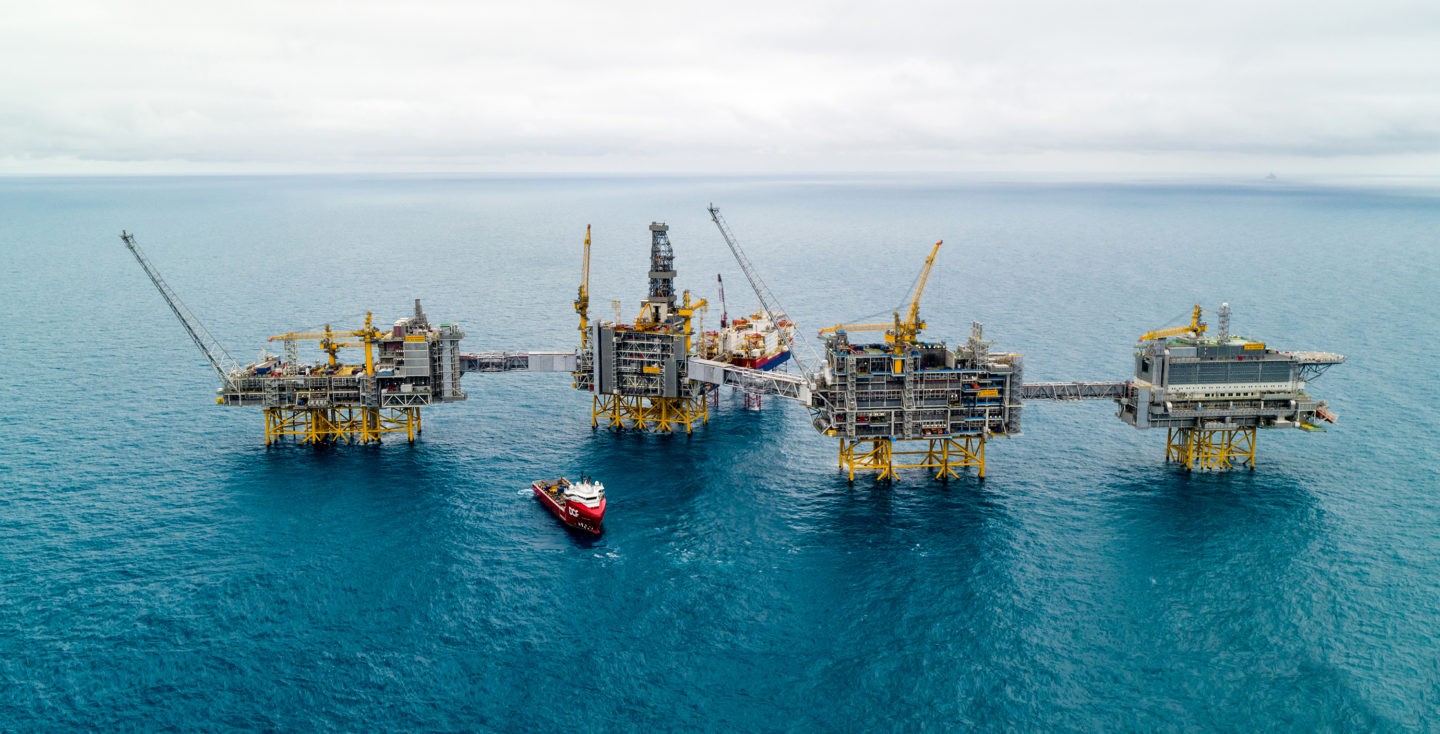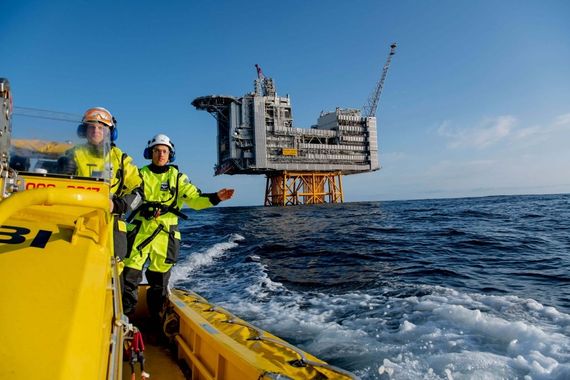
Digital sustainability: it pays to be a leader, not a laggard
Companies that excel in both digital and sustainable transformation attract a stock market premium, according to research. So, how do you tap into that value? ...

by Benoit F. Leleux, Loïc Godail Published 22 October 2021 in Sustainability • 6 min read
Oil and gas companies rarely come to mind as pioneers and forerunners in sustainability, but having long been labeled as an environmental and social villain, the industry has had plenty of time to address the issues that potentially challenge its license to operate.
Consequently, oil and gas companies have often been ahead of other industries in terms of corporate social responsibility (CSR). Calamities such as the Amoco Cadiz or Exxon Valdez oil spills and the Piper Alpha disaster forced oil companies to adopt strict health, safety and environmental standards and launch CSR projects for local communities in countries where they operated.
For some companies, such actions were undertaken to comply with new obligations, but others saw them as an opportunity to differentiate themselves by embracing sustainability and putting a higher purpose at the core of their strategies.
Lundin Energy, an independent oil and gas company listed in Sweden, embraced sustainability as far back as 2001, when the firm was established. And this early commitment to sustainability goals enabled the company to obtain operator rights in several countries, and to be aligned with the requirements of the authorities without jeopardizing its business model.
The company made its first investment in Norway in 2003, and all of its petroleum assets are now located in the country, which imposes strict regulations and high standards of governance on the industry. But rather than being constrained by this tough regulatory environment, Lundin’s leadership quickly understood the benefits of leveraging this regime to place sustainability at the core of its strategy.
Regulations such as the 1996 Norwegian Petroleum Act provide a strict framework for exploration and production companies. They help executives avoid socially and environmentally flawed decisions that would ultimately jeopardize long-term returns to stakeholders.

This has clearly been an advantage for Lundin Energy. “We operate in a world-class governance environment that gives us a competitive edge in providing low-carbon intensity, and responsibly managed energy resources,” Alex Schneiter, then President and CEO, noted last year.
Lundin Energy set a goal of carbon neutrality across its operations, aligned its reporting with the recommendations of the Task Force on Climate-related Financial Disclosures, and supported the UN Global Compact’s 10 Principles on human rights, labor standards, environment and anti-corruption, both within the company and along the value chain.
The company embraced sustainability, not only out of conviction but also to capture new opportunities, and to reduce its risk exposure. It was able to maintain an equilibrium between the three pillars of sustainability – environmental, social and economic – by embracing an innovative business model that generated shareholder and stakeholder returns while focusing on high-quality low expenditures, and a low carbon emission portfolio.
However, the company’s commitment to sustainability was severely tested last year, when a price war between Saudi Arabia, Russia and the US, along with the COVID-19-induced recession, created a global oil glut, leading to a sharp drop in the price of crude. Soon afterwards, countries began implementing schemes to drastically reduce output, including Norway.
Lundin’s commitment to ESG had survived a first brush with reality during the financial crisis of 2008, but this new, evolving situation was far more threatening. The company had to consider whether it was time to rebalance its priorities between the three pillars, and perhaps even revisit the rationale behind its sustainability drive.
In the event, Lundin held firm, and responded to the impact of the COVID-19 crisis by deferring or accelerating investments to maintain the equilibrium between the three pillars of sustainability. It deferred activity and reduced spending in areas that did not impact safety, asset integrity or production. Expenditure reductions and deferrals in 2020 totaled more than $360m compared with the original guidance.
The firm is now seen as a beacon for industry transformation, an inspiring example leading the energy transition by providing affordable energy to meet global demand while decarbonizing the whole system along the value chain
But at the same time, the company stood by its plans for $96m of investments in renewable energy projects in 2020, and also maintained its dividend policy. Its strong cash flow generation gave it a great deal of flexibility to allocate capital to development, debt repayment, dividends, or investments in exploration and renewables.
It was also helped by high levels of discipline across all of its teams, underpinned by strong ESG principles, which played a key role in emotionally bonding employees to a higher purpose.
On the social pillar, Lundin Energy responded quickly to the COVID-19 pandemic by the immediate implementation of detailed contingency plans to reduce the risk of the virus spreading in its operations and workforce. And it continued to take actions in support of the UN Sustainable Development Goals. For example, it contributed $300,000 to two Geneva-based institutions to provide food aid to the city’s residents in need of supplies during the lockdown.
On the economic pillar, there was no material disruption in operations despite the pandemic-related restrictions, and this ensured continued strong free cash flow generation through high levels of production at low operational expenditure
“Business continuity was not materially impacted, with 2020 production at the upper end of the original guidance range, and all our key projects are on track, thanks to our dedicated workforce who worked tirelessly to ensure appropriate risk mitigation and monitoring,” President and CEO Nick Walker said in the company’s 2020 Sustainability Report.
Future growth was also ensured by the winning of new exploration licenses, the continuation of key development projects, and the consolidation of its resource base through the acquisition of promising additional interests at low entry cost.
The company’s financial agility has also enabled it to take advantage of market opportunities. Lundin Energy has nine projects totaling roughly 200 MMboe (millions of barrels of oil equivalent per day) which it plans to accelerate to benefit from a temporary tax incentive announced by the Norwegian government.
On the environmental pillar, Lundin actually accelerated its decarbonization strategy. The objective of carbon neutrality was brought forward from 2030 to 2025, and the company has set a budget of $750m for investments in the electrification of offshore platforms, renewables (hydroelectricity and wind farms), and natural carbon capture projects.
The firm is now seen as a beacon for industry transformation, an inspiring example leading the energy transition by providing affordable energy to meet global demand while decarbonizing the whole system along the value chain. It also gained recognition from various ESG rating agencies in 2020, including Vigeo Eiris, ISS-oekom, Sustainalytics, MSCI and CDP.
In December 2020, it successfully completed the refinancing of a $5bn corporate credit facility, with improved terms linked to ESG key performance indicators on carbon intensity and renewable electricity generation
Its focus on minimizing emissions along the value chain enabled it to report a 2020 total carbon footprint of 2.6kg CO2 per barrel of oil equivalent, compared with an industry average of about 8kg CO2/boe in Norway, and 18kg CO2/boe worldwide.
Lundin’s continued commitment to sustainability also yielded financial benefits. It was able to report strong financial results despite the pandemic. Increased production and low operating costs enabled the company to increase EBITDA (earnings before interest, taxes, depreciation and amortization) to $2.14bn in 2020, and it is forecasting free cash flow levels of $650m-$1bn a year over the 2021-2026 period.
And in December 2020, it successfully completed the refinancing of a $5bn corporate credit facility, with improved terms linked to ESG key performance indicators on carbon intensity and renewable electricity generation. “This further demonstrates the financial value which can be realized from industry-leading sustainable operations,” said Lundin Energy CFO Teitur Poulsen.
Capital providers evidently value businesses with clear sustainable strategies and execution, and even more so when they stand by their commitments in times of crisis. Lundin’s strategy was also appreciated by investors, who regard the company’s use of renewable energy for offshore power generation as a factor that gives it a material advantage over its peers.

Benoît Leleux is the Stephan Schmidheiny Professor of Entrepreneurship and Finance at IMD. He is Co-Director of Foundations for business leaders program and Program Director of Winning Sustainability Strategies program.
Loïc Godail is Managing Director of OulhenCo and has more than 20 years’ experience in technical, operational, and management roles in the petroleum industry.

17 July 2024 • by Michael R. Wade, Evangelos Syrigos in Sustainability
Companies that excel in both digital and sustainable transformation attract a stock market premium, according to research. So, how do you tap into that value? ...

11 July 2024 • by Stéphane J. G. Girod in Sustainability
A series of watershed events forced CHANEL out of its comfort zone, culminating in the launch of CHANEL Mission 1.5°. With this new strategy, the luxury fashion house embarked on a journey...

5 July 2024 • by Avni Shah in Sustainability
Creative industries have a key role to play in creating positive social change. Here are six key insights to help them achieve their goals. ...

3 July 2024 • by Richard Baldwin, Salvatore Cantale in Sustainability
The EU Corporate Sustainability Reporting Directive (CSRD) will impose comprehensive and standardized sustainability reporting responsibilities on firms, adding unprecedented complexity to mergers and acquisitions. ...
Explore first person business intelligence from top minds curated for a global executive audience